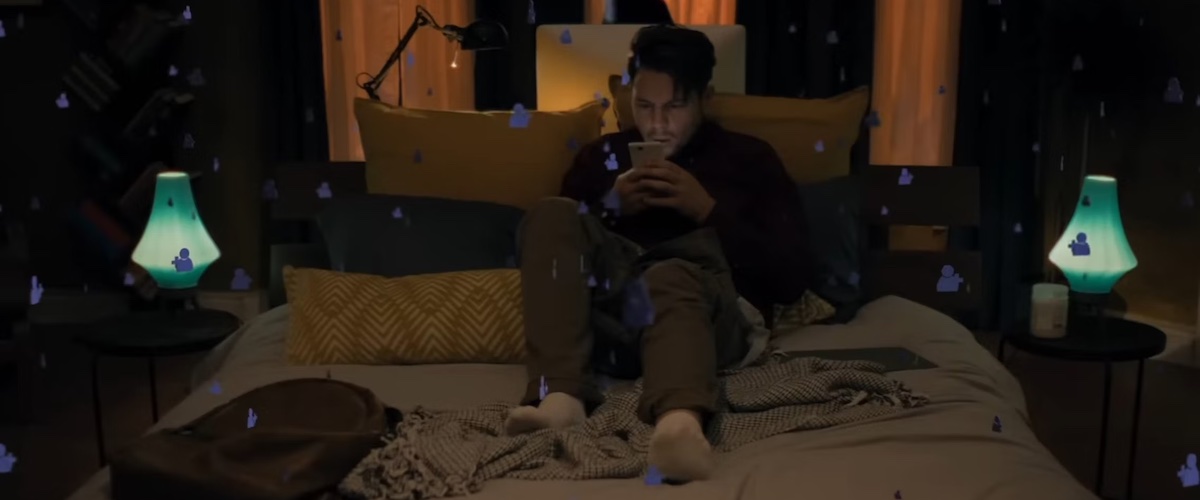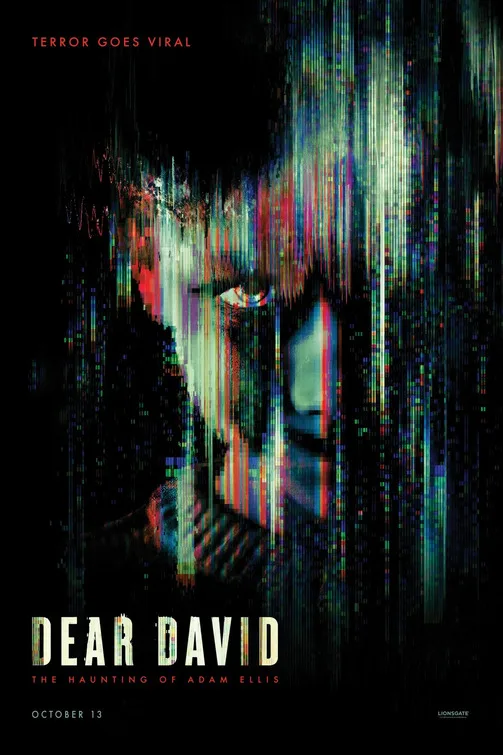If “Zola” was one of the best adaptations of a Twitter thread to make it to the big screen, consider “Dear David” one of the worst. Based on a true(-ish?) story, “Dear David” follows Adam Ellis (Augustus Prew), a struggling comic artist working in the viral content mines of Buzzfeed in the internet yesteryear of 2017. In the middle of personal and professional uncertainty and a few Twitter feuds with trolls, Adam begins to suffer from sleep paralysis. He is unable to move when he notices his green rocking chair moving on its own or a door in his apartment swings out of its own volition. He notices an apparition staring back at him from the green rocking chair. Now, a cherub face with missing eyes is invading his nightmares (or are they his waking hours now?). As Adam plunges further into the ghost world, his best friend and co-worker Evelyn (Andrea Bang) and ex-boyfriend Kyle (René Escobar Jr.) become increasingly worried: Is their friend’s regular tweets about a ghost named David in his apartment real or his break from reality? Despite what his loved ones may suspect, the physical threats to Adam are only just beginning.
Based on the collection of the real Ellis’ original ghostly tweets, “Dear David” fails to recreate the dread many felt when reading Ellis’ account as they happened in real-time. Whatever genuinely creepy moments, like the chair that rocks on its own or that his two cats stood by the door every night at midnight as if watching something outside, feel watered down by the extra storylines thrown in to expand the thread to a feature-length movie. As John McPhail (“Anna and the Apocalypse”) and screenwriter Mike Van Waes try to give David more of a background in 1996 and insert more drama into Adam’s life, very little of it helped make the case for “Dear David” stronger. Even some dialogue and exchanges between Adam, his coworkers, his ex, or sources feel as unbelievable as when these eerie moments are staged for the big screen.
Perhaps the weirdest part of this ghost story is how and when the filmmakers decide to venture away from their source material. Van Waes, who shares a story credit with executive producer Evan Turner, can’t give the material more heart and soul than a made-for-TV movie, and McPhail and cinematographer Stephen Chandler Whitehead can’t make it look much better than one either. Whitehead also falls into the same trap many recent horror movies have bumbled into, which is to make certain scenes so dark it’s hard to see your characters, let alone the monster, in an attempt for ambiance.
Something is lost in moving “Dear David” from its native digital platform. The scrappy creepypasta told in little dispatched bursts, loses a sense of its suspense and terror. Even when aggregated into a BuzzFeed article, the story feels less threatening, and now, in its cinematic form, “Dear David” is kind of laughably silly, not spooky.
As the fourth BuzzFeed Studios movie after titles like “Puppy Love” and “My Fake Boyfriend,” “Dear David” does not bode well for a promising bright future in repackaging the site’s viral content and youth-centric ethos. Even in the film, which keeps Adam’s place of employment intact, there are jokes about the sorry state of media, the crushing pressure for traffic, and the push for aggregated metrics to prove you’re popular online. If the horror elements in this movie feel abysmal, the top ten listicle jokes and Justin Long’s portrayal of BuzzFeed CEO Jonah Peretti don’t fare much better. “Dear David” is branded content—uninspired and hollow to a fault—and perhaps that’s even more disturbing than a five-year-old internet ghost story.
Now playing in theaters.




















